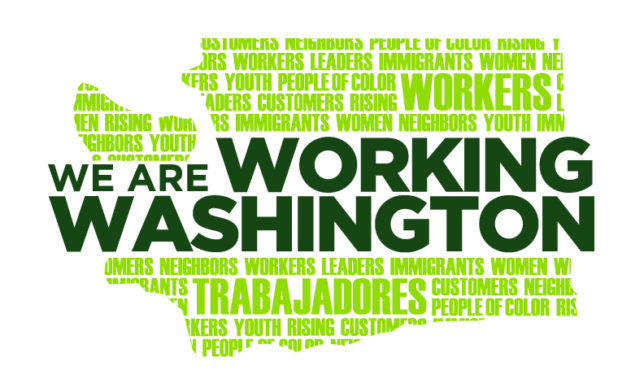Labor Watch
Working Washington: An SEIU Subsidiary


Working Washington lists itself as a 501(c)(4) nonprofit organization created to represent low-wage workers in the state of Washington. It is closely tied to the Service Employees International Union (SEIU).
The group first emerged in 2011 as part of the SEIU’s Fight for a Fair Economy campaign to raise the minimum wage for fast food workers in the state of Washington. Next, the group began working with other union organizations including Teamsters and the United Food and Commercial Workers in a grassroots campaign for its own referendum to increase the minimum wage to $15 in the city of SeaTac, home of the Seattle-Tacoma International Airport. In 2013, the referendum passed, and Working Washington and the SEIU followed up with further grassroots action to push the city of Seattle to adopt a $15 an hour minimum wage for workers, which it did in 2014.
Interlocking Leadership
From its inception, Working Washington has supported SEIU’s ideology. Its website describes Working Washington as “guided by the vision of SEIU International’s leadership as well the leaders and members of SEIU locals, community groups, faith organizations and other labor unions in Washington state.” Working Washington even shares office space with SEIU Local 775, one of the more prominent SEIU chapters on the West Coast, which represents low-wage workers and employees in Washington and Montana.
Several members of the group’s leadership and its board members have connections to the SEIU and other labor union organizations. David Rolf, president of the board of directors, is the president of SEIU Local 775 and a vice president of SEIU. One current board member is Memo Rivera, who is also vice president and organizing director for SEIU 775. Previous board members include Andrew Beane, former director of strategic campaigns at SEIU 775; Shelly Hughes, an executive board member for SEIU 775; and Anastasia Christman, who worked for several SEIU chapters including 775.
Executive director Rachael Lauter is also head of Fair Work Center, a legal group focused on workers’ rights. Board vice president and secretary Brianna Thomas was field director of Washington Alliance Action Fund, the 501(c)(4) arm of the Washington Low Income Housing Alliance super political action committee (PAC). In addition, Board Treasurer Nicole Grant is the executive secretary-treasurer of the M.L King County Labor Council, the central body of labor organizations in King County.
Funding
Working Washington’s funding is heavily intertwined with the SEIU and similar organizations. Its most recent 990 form (for 2017) states the organization received roughly $810,149 in donations and grants that year from outside organizations. Of that, $511,134 (63 percent) came from SEIU organizations: SEIU 775 gave $419,717, and SEIU Leadership Council 14 gave $91,417. In total, Working Washington has received over $14 million from the SEIU and its affiliates.
Working Washington along with several labor organizations including Civic Ventures, SEIU 775, and OneAmerica Votes formed the Civic Alliance for a Progressive Economy (CAPE), a super PAC in favor of far-reaching social and economic policies for workers in Washington State. These include increased pay for “gig economy” workers, expanded medical debt relief, rental vouchers for workers who are former inmates, and unemployment benefits for illegal immigrants. In 2019, Working Washington contributed over $14,000 to CAPE, and SEIU contributed $173,000.
Pay Up Campaign
Working Washington’s Pay Up campaign is significant part of its support for SEIU-favorable regulations. The Pay Up campaign is “focused towards workers of food delivery services.” Launched in 2019, Pay Up’s campaign has pushed for increased benefits for gig workers for food delivery services such as DoorDash, InstaCart, and Postmates. These include a $15 pay floor rate plus the cost of gas and expenses, tipping staff at 100 percent, and disclosing how pay rates are set.
In September 2019, Pay Up helped organize several protests against major delivery services to demand implementation of these policies. In June 2020, Seattle enacted five days of paid sick leave and “premium pay” of $2.50 per trip for delivery workers. Pay Up is still pushing for $5 per trip in hazard pay along plus an additional $5 to workers that need to physically shop for certain items on the job.
During the ongoing COVID-19 pandemic, Pay Up continues to criticize delivery companies for not meeting their demands and to organize protests for its social policies. For example, it criticized DoorDash for not setting the $15 pay floor and for charging fees for gloves and hand sanitizers for delivery workers. When Postmates announced it would work with restaurant chain Chipotle to provide free delivery to customers, Pay Up pushed for Postmate workers to go on strike (#GuacOff) and to demand hazard pay and sick leave.
COVID Demands
Outside food delivery services, Working Washington has also pushed for housing-related social policies in the Seattle area due to COVID-19. These include banning evictions, suspending utility shutoff, mandating medical benefits for all employees, and offering emergency income aid. In April 2020, it sent an open letter signed by over 400 other labor groups and organizations to Gov. Jay Inslee demanding the state to create a $100 million fund to support illegal immigrants during the pandemic.
Minimal Impact
Working Washington appears to be working in complete harmony with large labor unions such as the SEIU, as became quickly apparent during the COVID-19 pandemic. Yet its big pushes such as Pay Up have apparently had minimal substantial impact on the operations of the intended targets, such as food delivery and grocery establishments. But whether that will continue is uncertain.



